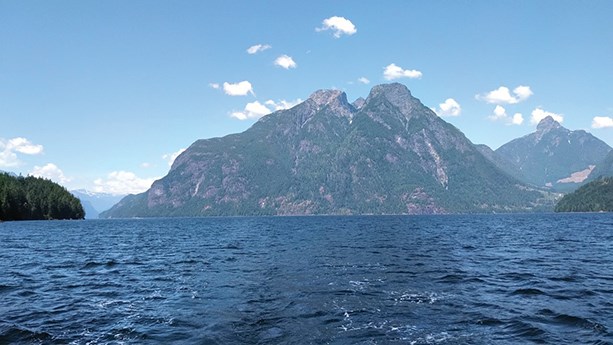As of June 21 — National Indigenous Peoples Day — shíshálh Nation placenames will be restored to 10 waters and village sites within its swiya (lands, world, birthplace or territory) on the Sunshine Coast.
The changes include the waterways of:
- Jervis Inlet to lekw’emin
- Earls Cove to sḵelh
- Pender Harbour to ḵalpilin
- Deserted Bay to ts’unay
- Deserted River to ts’unay stulu
- and Hunaechin Creek to x̱enichen stulu
- On land, Mount Victoria will be known as ḵ’els.
Previously unnamed locations have also received names:
- the major village site at the head of lekw’emin has been named x̱enichen
- the major village site at the mouth of ts’unay stulu has been named ts’unay
- and the previously unnamed lake east of Chapman Lake within the Tetrahedron Park has been named mala/Hind-Smith Lake.
Pronunciations can be found at shishalh.com/culture-language/sechelt-language/.
In a press release, the Nation announced the work done under the shíshálh-B.C. Foundation Agreement. lhe hiwus yalxwemult (Chief Lenora Joe) said, “This is a great achievement that shows the importance of our journey together towards reconciliation. These placenames have great meaning to the shíshálh people that dates to time immemorial.
“Recognizing these original placenames honours our ancestors, heals and teaches our present shíshálh members and will continue to revitalize our language and culture for future generations. We are grateful for the support of our provincial and regional district partners. There is no end date to reconciliation. We continue to learn and work together to bring real progress to reconciliation.”
The Minister of Tourism, Arts, Culture and Sports Lana Popham acknowledged the 10 placenames as important work toward reconciliation. “Indigenous names hold great significance,” she said in the press release. “Recognizing the cultural history and heritage values of these places fosters greater understanding and appreciation among both residents and visitors for their deep history.”
Comments on the proposed name changes were invited from relevant organizations from September 2022 to April 2023, and showed broad support.
The placenames are part of the 2018 Foundation Agreement, which also includes land transfers to shíshálh Nation, shared decision-making and co-operation on land-use planning. Recognizing and restoring placenames is also part of the implementation of the United Nations Declaration on the Rights of Indigenous Peoples through the Declaration on the Rights of Indigenous Peoples Act.



